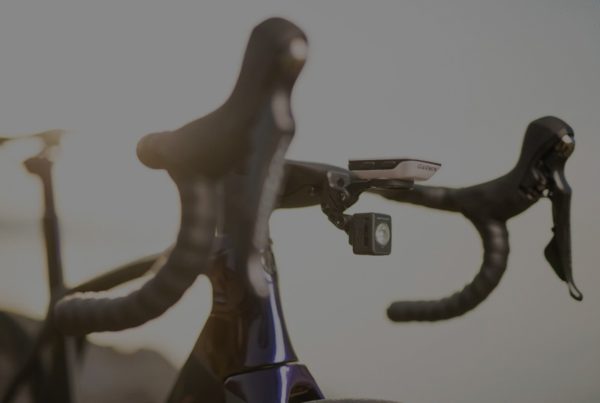Linda Willsey distinctly remembers the moment: She was on her bike, riding home from work, when the car door was flung open directly into her path. There was barely time to yell “No!” before she was sailing through the air, landing on her back, fracturing a vertebra and sustaining multiple contusions.Linda Willsey distinctly remembers the moment: She was on her bike, riding home from work, when the car door was flung open directly into her path. There was barely time to yell “No!” before she was sailing through the air, landing on her back, fracturing a vertebra and sustaining multiple contusions.
She was taken to emergency; while she was there, waiting to be x-rayed, Madison Police officer Jean Papalia approached her, and apologizing, handed her a citation. The charge? Willsey had violated the Wisconsin statute requiring cyclists who are passing vehicles to do so with a minimum passing distance of three feet.
Some seventy miles away, in Brookfield, Wisconsin, cyclist Jeff Frings (See Attack of the abominable snow (plow) man and Plowing through some touchy issues) had been busy fighting his own battle over Wisconsin’s other three-foot passing law – the one that requires drivers to pass cyclists with a minimum three-foot safe passing distance. The problem in Brookfield was the police department was refusing to cite a driver who had passed Jeff with less than the required three-foot minimum – and in fact, the police had gone so far as to tell Jeff the buzzing was his fault because he hadn’t been riding on the shoulder.
While Linda Willsey was recuperating in Madison from the dooring police were blaming on her, Frings was mulling over the warnings he had received from Brookfield police that he would be cited if a car made an unsafe pass as a result of his lane positioning. The problem stemmed from differing interpretations of the law – Frings believes that as long as he is traveling at the speed limit, Wisconsin law allows him to take the lane. Brookfield officialdom, on the other hand, believes that Frings must be riding at the normal speed of traffic – even if the normal speed of traffic is in violation of the speed limit – in order to legally take the lane. And in fact, there is some merit to the City’s position – Wisconsin law does not require that the normal speed of traffic be “reasonable,” which would mean that the speed must be lawful – it only refers to the “normal” speed of traffic. On the other hand, Frings’ position also has some merit – he is not actually “taking the lane” – he is riding as close to the right as is practicable, given the sand littering the shoulder of the road.
Regardless of whether or not Frings is may legally take the lane, the position of Brookfield officialdom strains justice:
• Motorists are so pervasively violating the speed limit that the “normal speed” of traffic is not the legal speed. Nevertheless, these motorists are not threatened with citations for violating the law.
• Motorists who violate the minimum safe passing distance statute are not threatened with citations for violating the law.
• A cyclist who is riding as close as practicable to the right, and who is subsequently buzzed by speeding motorists, is threatened with citations for an imaginary violation of the law.
If these circumstances might have suggested that cyclists are being treated as second-class citizens in the State of Wisconsin, Linda Willsey’s case seemed to confirm it. At one level, the Wisconsin statute makes sense, because it places the burden for avoiding doorings on the cyclist – in other words, it legally empowers the cyclist to ride outside of the door zone – at least theoretically. Think about it for moment – we can pass laws that make it illegal for motorists to door us, but we can’t force them to have the sense to look before opening their doors. By placing the burden on the cyclist – the one person who can control the situation – the law empowers us to make safe riding decisions. That’s the theory, anyway. The reality, however, is that many of Madison’s bike lanes are placed squarely within the door zone, which results in cyclists being forced to ride where they will be held responsible for the carelessness of the drivers.
The way the laws are being enforced in Wisconsin places cyclists in a damned if we do, damned if we don’t position. Ride too close to the right, and the cyclist faces a citation for “causing” a dooring. Ride further to the left – whether to avoid a door zone or to avoid debris on the shoulder- and the cyclist faces a citation for not riding “as close as possible” to the right.
Willsey didn’t think her ticket was fair – after all, it was the motorist who opened the door on her at the last moment – and she didn’t think it was fair that the driver’s insurance company had sent her a letter informing her that it would not be paying any potential claims she might file. Well, she hadn’t been planning on filing a claim, but if that letter was meant to discourage her, it had the opposite effect, inspiring her to fight both her ticket and the insurance company.
So she went to court…where the Judge refused to dismiss her ticket, but offered her the option of attending bike safety school. Willsey rejected that option, reasoning that accepting would be tantamount to admitting that she did something wrong, and announced that if she can’t get her ticket dismissed, she might take her case to a jury.
Her case has also attracted the attention of the Bicycle Federation of Wisconsin and State Senator Fred Risser, with both talking about introducing legislation that would require drivers to use “due care” when opening a car door.
Seventy miles away, Jeff Frings has reached an impasse in his efforts to have Wisconsin’s three-foot passing law enforced in Brookfield…Which is interesting, because he also reached an impasse over this law with the New Berlin Police Chief (See Plowing through some touchy issues). And yet, as Jeff happily reports, he’s had some very productive talks with the New Berlin Police Chief since that impasse. His story has even made the local news, in a story that is well worth the watch.
In 1779, when locked in a stalemate during the battle with the British frigate Serapis, American naval hero John Paul Jones was taunted by the British to surrender. His reply was legendary: “I have not yet begun to fight.”
Given Jeff Frings’ track record in other Wisconsin cities, something tells me that despite the current impasse, Jeff has not yet begun to advocate for cyclist’s rights in Brookfield.
Bob
(Research and drafting provided by Rick Bernardi, J.D.)
I’d like to thank everybody who has contacted me to request my appearance at their event. I will be speaking as extensively on “Bicycling & the Law” this year as my practice will allow, and will make plans to appear before any club, bike shop, or other engagement that is interested in hosting me. If you would like me to appear to speak at your event or shop, or to your club or group, please drop me a line at bookbob2speak@gmail.com (and if you would like to contact me with a question or comment not related to my speaking tour, please drop me a line at mionskelaw@hotmail.com). I’m looking forward to meeting as many of my readers as possible this year.



